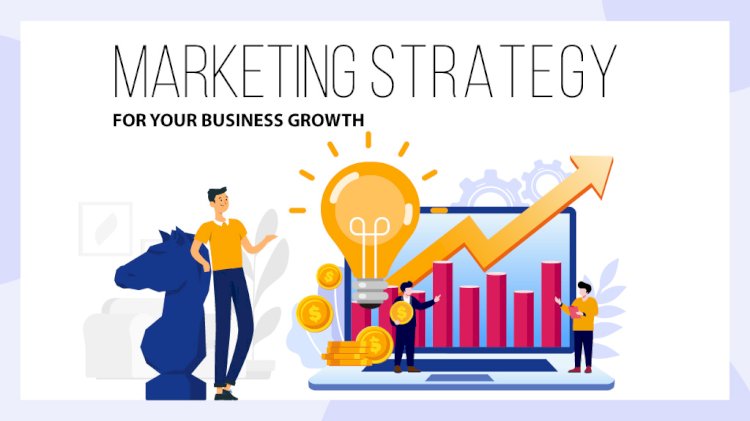Marketing Growth Strategies for Startups: Scaling Your Business to New Heights
Scaling a startup requires a targeted marketing strategy that adapts to your business’s growth stage. By deeply understanding your market, utilizing digital marketing tools, crafting a compelling brand identity, and forging strategic partnerships, startups can unlock new growth opportunities. Continuous measurement and optimization of key metrics ensure your marketing efforts drive sustained success as your business scales.

Scaling a startup is an exhilarating yet challenging phase in any entrepreneur's journey. While the foundation has been set, the next step requires robust strategies to ensure sustainable growth. Marketing plays a pivotal role in this, helping startups expand their reach, enhance brand visibility, and ultimately, scale successfully. This blog post will explore key marketing growth strategies tailored for scaling startups.
- Understanding the Startup Ecosystem
Before diving into marketing strategies, it's crucial to understand the unique dynamics of the startup ecosystem. Startups operate in fast-paced environments where agility and innovation are key. This ecosystem is characterized by limited resources, intense competition, and a need for rapid growth. Understanding these factors will help in crafting marketing strategies that align with the startup's goals and industry context.
- Leveraging Digital Marketing
Digital marketing is a powerhouse for scaling startups. It offers a cost-effective way to reach a large audience and build brand awareness. Here are some key digital marketing tactics:
- Content Marketing: Creating valuable, relevant content that resonates with your target audience can help establish your startup as a thought leader in your industry. This could include blog posts, whitepapers, videos, and infographics.
- SEO (Search Engine Optimization): Optimizing your website and content for search engines is essential for driving organic traffic. Focus on long-tail keywords that are relevant to your niche, as they often have less competition and can yield high conversion rates.
- Social Media Marketing: Utilize platforms like LinkedIn, Twitter, and Instagram to engage with your audience, share content, and build a community around your brand. Paid social media campaigns can also be effective for targeted advertising.
- Email Marketing: Building and nurturing an email list allows you to maintain direct communication with potential customers. Personalized email campaigns can drive conversions and customer loyalty.
- Building a Strong Brand Identity
As your startup scales, maintaining a consistent and strong brand identity becomes increasingly important. Your brand is not just a logo or a tagline; it's the perception that customers have of your company. To build a strong brand identity:
- Define Your Brand Values: Clearly articulate what your startup stands for. This includes your mission, vision, and core values.
- Consistent Messaging: Ensure that all your marketing materials convey a consistent message that aligns with your brand identity. This includes your website, social media profiles, and advertising campaigns.
- Visual Identity: Invest in professional design to create a visually appealing and cohesive brand. This includes your logo, color palette, typography, and overall design aesthetic.
- The Power of Partnerships
Partnerships can be a game-changer for scaling startups. By collaborating with other businesses, you can access new audiences, share resources, and enhance your credibility. Consider the following types of partnerships:
- Strategic Alliances: Partner with companies that offer complementary products or services. For example, a fintech startup could partner with an e-commerce platform to offer integrated payment solutions.
- Influencer Collaborations: Collaborating with influencers who have a strong following in your niche can amplify your brand’s reach. Choose influencers whose values align with your brand for authentic partnerships.
- Co-Marketing Campaigns: Team up with other startups or established businesses to create joint marketing campaigns. This could include co-branded content, webinars, or promotional offers.
- Measuring and Optimizing Growth through KPIs
To ensure your marketing efforts are driving growth, it's essential to measure and optimize your strategies using key performance indicators (KPIs). Some crucial KPIs for scaling startups include:
- Customer Acquisition Cost (CAC): The cost of acquiring a new customer. Keep track of this metric to ensure your marketing efforts are cost-effective.
- Customer Lifetime Value (CLTV): The total revenue a customer is expected to generate during their relationship with your startup. A high CLTV indicates that your customers find value in your offerings.
- Conversion Rate: The percentage of visitors who take a desired action, such as signing up for a newsletter or making a purchase. Monitor and optimize your conversion rate to improve ROI.
- Churn Rate: The percentage of customers who stop using your product or service over a specific period. Reducing churn is vital for sustainable growth.
Conclusion
Scaling a startup requires a strategic approach to marketing that leverages digital tools, builds a strong brand, and forms valuable partnerships. By understanding your ecosystem, consistently measuring your efforts, and optimizing your strategies, you can set your startup on a path to sustainable growth and long-term success. Remember, marketing is not just about attracting new customers but also about nurturing existing relationships to drive lasting value for your startup.

 Yati Garg
Yati Garg 






















